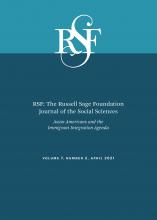Abstract
We argue that two factors are important for cross-racial coalition building: policy convergence in key issue arenas and perceived interest alignment with other racial groups. Drawing on the 2016 National Asian American Survey, we examine two of the most salient issues Asian Americans consistently rate as among the most important: immigration and economic policy. Using principal component analysis, we plot mean scores by group to analyze national-origin clustering along these two dimensions. Next, we analyze national-origin differences in perceived interest alignment with Blacks and Latinos. Combining these two factors, we identify clusters of groups that have a strong potential for cross-racial coalition building and that face greater constraints. In sum, we propose a theoretical framework for understanding cross-racial coalition building that includes disaggregating Asian Americans by national origin, and then identify which national-origin groups have the greater opportunity to form such coalitions.
- © 2021 Russell Sage Foundation. Arora, Maneesh, Sara Sadhwani, and Sono Shah. 2021. “Unpacking Identity: Opportunities and Constraints for Cross-Racial Collaboration.” RSF: The Russell Sage Foundation Journal of the Social Sciences 7(2): 93–110. DOI: 10.7758/RSF.2021.7.2.05. The authors thank the other participants of the Russell Sage Foundation’s Asian Americans: Diversity and Heterogeneity conference for their helpful and incisive comments. Direct correspondence to: Maneesh Arora at maneesh.arora{at}wellesley.edu, Wellesley College 106 Central St., Wellesley, MA 02481, United States.
Open Access Policy: RSF: The Russell Sage Foundation Journal of the Social Sciences is an open access journal. This article is published under a Creative Commons Attribution-NonCommercial-NoDerivs 3.0 Unported License.






